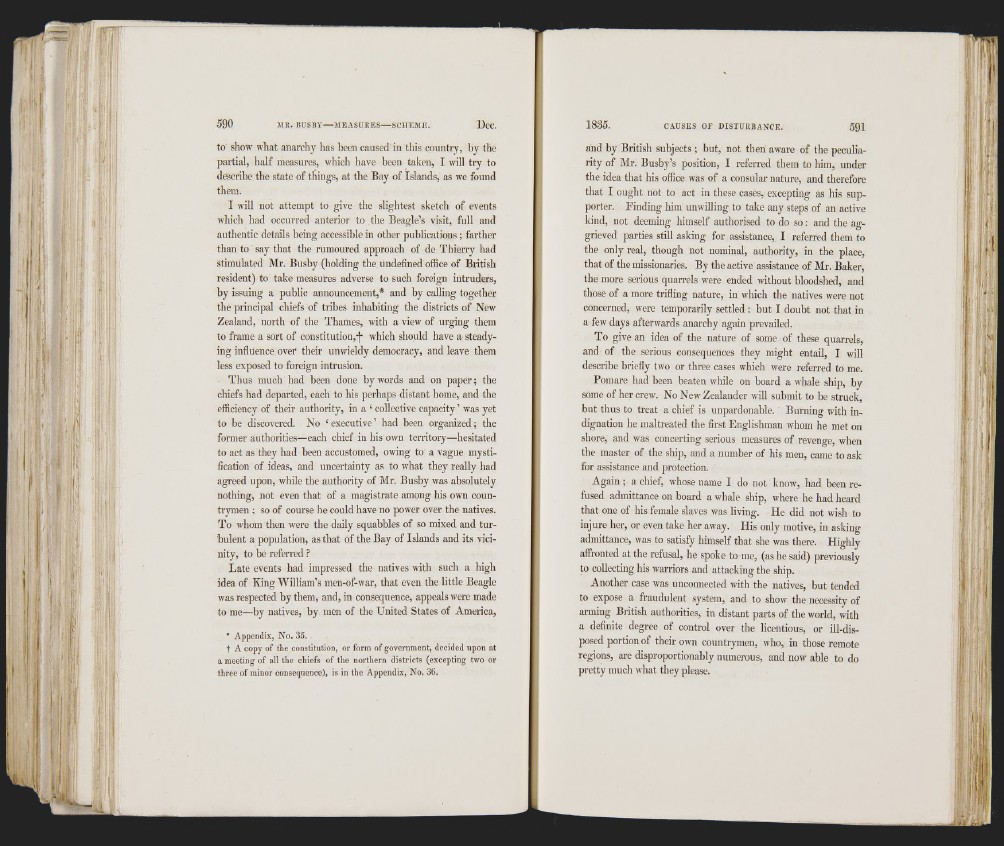
■t1 à\‘\ #' I1
Lî
t L
,.vi
1? I L
to show what anarchy has been caused' in this country, by the
partial, half measures, which have been taken, I will try to
describe the state of things, at the Bay of Islands, as we found
them.
I will not attempt to give the slightest sketch of events
which had occurred anterior to the Beagle’s visit, full and
authentic details being accessible in other publications ; farther
than to say that the rumoured approach of de Thierry had
stimulated Mr. Busby (liolding the undefined office of British
resident) to take measures adverse to such foreign intruders,
by issuing a public announcement,* and by calling together
the principal chiefs of tribes inhabiting the districts of New
Zealand, north of the Thames, with a view of urging them
to frame a sort of constitution,# which should have a steadying
influence ovei their unwieldy democracy, and leave them
less exposed to foreign intrusion.
Thus much had been done bywords and on paper; the
chiefs had departed, each to his perhaps distant home, and the
efiiciency of their authority, in a ‘ collective capacity ’ was yet
to be discovered. No ‘ executive’ had been organized; the
former authorities—each chief in his own territory—hesitated
to act as they had been accustomed, owing to a vague mystification
of ideas, and uncertainty as to what they really had
agreed upon, while the authority of Mr. Busby was absolutely
nothing, not even that of a magistrate among his own countrymen
; so of course he could have no power over the natives.
To whom then were the daily squabbles of so mixed and turbulent
a population, as that of the Bay of Islands and its vicinity,
to be referred ?
Late events had impressed the natives with such a high
idea of King William’s men-of-war, that even the little Beagle
was respected by them, and, in consequence, appeals w'ere made
to me—by natives, by men of the United States of America,
* Appendix, No. 35.
t A copy of the constitution, or form of government, decided upon at
a meeting of all the chiefs of the northern districts (excepting two or
three of minor consequence), is in the Appendix, No. 36.
and by British subjects ; but, not then aware of the peculiarity
of Mr. Busby’s position, I referred them to him, under
the idea that his office was of a consular nature, and therefore
that I ought not to act in these casés, excepting as his supporter.
Finding him unwilling to take any steps of an active
kind, not deeming himself authorised to do so : and the aggrieved
parties still asking for assistance, I referred them to
the only real, though not nominal, authority, in the place,
that of the missionaries. By the active assistance of Mr. Baker,
the more serious quarrels were ended without bloodshed, and
those of a more trifling nature, in which the natives were not
concerned, were temporarily settled : but I doubt not that in
a few days afterwards anarchy again prevailed.
To give an idea of the nature of some of these quarrels,
and of the serious consequences they might entail, I will
describe briefly two or three cases which were referred to me.
Pomare had been beaten while on board a whale ship, by
some of her crew. No New Zealander will submit to be struck,
but thus to treat a chief is unpardonable. Burning with indignation
he maltreated the first Englishman whom he met on
shore, and was concerting serious measures of revenge, when
the master of the ship, and a number of his men, came to ask
for assistance and protection.
Again ; a chief, whose name I do not know, had been refused
admittance on board a whale ship, where he had heai-d
that one of his female slaves was living. He did not wish to
injure her, or even take her away. His only motive, in asking
admittance, was to satisfy himself that she was there. Highly
affronted at the refusal, he spoke to me, (as he said) previously
to collecting his warriors and attacking the ship.
Another case was unconnected with the natives, but tended
to expose a fraudulent system, and to show the necessity of
arming British authorities, in distant parts of the world, with
a definite degree of control over the licentious, or ill-disposed
portion of their own countrymen, who, in those remote
regions, are disproportionably numerous, and now able to do
pretty much what they please.
t v